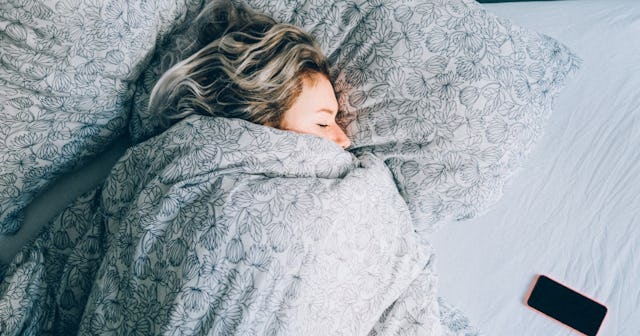Sleep Talking? What To Do If Nighttime Rambling Is Wrecking Your REM Cycle
Ever heard of somniloquy?

There’s something quite vulnerable about having a sleepover, whether it’s your kid crashing with friends or the first time you stay over with a new significant other. And that’s because sometimes, we do strange things when we sleep. Sleep talking can be pretty unnerving for someone unprepared, especially if you happen to babble or say something that seems scary. But have no fear — talking in your sleep is far more normal than you may think.
According to the Sleep Foundation, roughly 66 percent of people talk in their sleep. And that means it’s actually abnormal if you never have! Sleep talking is strange in a way, though. Less than a quarter of that 66 percent have had sleep talking episodes within the last three months. It can be hard to know when you have one and the reasoning.
So, whether you’re hoping to learn how to stop sleep talking for yourself, your partner (so they’ll stop interrupting your REM cycle), or a child, the following information will help you navigate this type of parasomnia.
What is somniloquy?
If you’ve been looking up this somewhat embarrassing phenomenon, you might have run by the phrase “somniloquy.” It’s quite a handful of a word, especially when it’s literally just defined as “sleep talking.” Somniloquy is just one type of parasomnia or sleep disturbance. That’s why many people choose to just stick with the phrase “sleep talking.” It’s a bit more self-explanatory.
Is there a sleep talking app to help identify the issue further?
Sleep talking can be tough to capture since, you know, you’re asleep at the time. Most people recognize they’re in the pattern based on a story told to them by a secondary party. Raise your hand if anyone’s ever said to you that you were “talking up a storm in your sleep,” which naturally sent you into a panic. What did you say? Was it weird? Was it inappropriate? It’s very easy to feel out of control when you have no idea what you said.
That’s where a sleep talking app, or just a sleep tracking app, may come in handy. The iPhone app store has an app called Sleep Talk Recorder that many somniloquy sufferers have downloaded before — five million of them, to be more specific. Night Lab is often a good recommendation for Android users. This app monitors your sleep so that you know whether or not you talk, snore, walk, or are lucky enough to be a heavy sleeper.
Even if you don’t talk in your sleep, it can still be a lot of fun to monitor sleep patterns. For many people, having a good idea of what goes on at night has encouraged healthier habits.
Is there any sort of sleep talking spiritual meaning?
It’s very understandable why these might be linked. It’s similar to the theories we have about dreams. Some people believe that that’s how spirits communicate with us, and it’s a very soothing thought.
The more common belief is that there can be underlying causes as to why you tend to talk at night. Excessive amounts of alcohol or a new prescription might be the culprit. Like your nighttime coffee? That, too, might cause you to chat more than usual during the late-night hours. But sometimes, it can happen when you’re overly stressed out.
Of course, it doesn’t hurt to find some spiritual meaning in your sleep talking. If someone told you that you said something that gives you a bit of mental clarity, consider it a silver lining.
Are there any sleep-talking treatments?
Sadly, no. There aren’t any active treatments that will stop your nighttime chattiness in its path. But, like with most things, a healthier diet can make a huge difference. Cutting down on tobacco and alcohol might curb it, as well as making sure you’re getting plenty of sleep at night. Find ways to wind down naturally, and see if they help in the long run. Yoga, meditation, or just listening to white noise might help you sleep better.
Creating a relaxing bedtime routine will also help you calm down before going to bed. Avoid eating heavy or anything too spicy and write down your thoughts and feelings in a journal. This will give your mind a chance to wind down and eliminate any negative thoughts or feelings, which will help you feel more settled before falling asleep.
The good news is that, health-wise, there’s nothing to fear. Talking in your sleep isn’t a symptom of anything more significant. If anything, it can just be a little embarrassing when you wake someone up with your wild nocturnal ramblings about explosive eyedrops or the magical paintbrush of Bob Ross. Even if your partner doesn’t notice you sleep talking (since they’re also fast asleep), it’s still always good to know as much as you can about your sleep habits.
What does shouting in sleep mean?
Sleep talking is a bit different from sleep shouting. When someone appears to be shouting in their sleep, this could be a sign of a sleep terror. They are also known as night terrors and usually accompanied by kicking or wild body movements. Someone experiencing sleep terrors may be hard to awaken from their sleep.
This article was originally published on